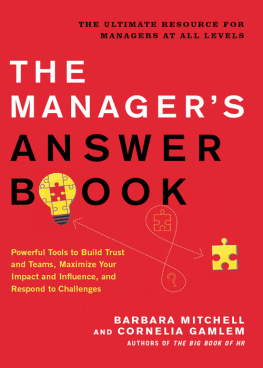All rights reserved.
A portion of the proceeds from this book will go to Coastlines Acquired Brain Injury Program scholarships and services: a program which helped me see change clearly.
In memory of Brianne Catherine Schwantesadvocate, friend, and a model of compassionate authenticity. We will continue to remember one of your favorite quotes from Grandma Eileen:
No one should be taught to be afraid of life. Bad things are going to happen, and well just deal with them one at a time.
I still wear my safety pin.
Introduction
Theres a tide in the affairs of men which, taken at the flood, leads on to fortune; Omitted, all the voyage of their life is bound in shallows and in miseries. On such a full sea are we now afloat, and we must take the current when it serves, or lose our ventures.
William Shakespeare, Julius Caesar, Act IV
Greg Devereaux was quoting Shakespeare and poetically telling me to take the leap. It was the third time in as many weeks that the city manager of Ontario, California, had asked me to his office. Each time, hed offered me a promotion to the position of Administrative Director in the police department, which I turned down each time because I loved my job at the Ontario Fire Department. Greg remained silent after quoting Shakespeare. I asked if I could go speak to my boss, Fire Chief Chris Hughes.
Not only was I surprised that the city manager would resort to a perfectly recited quote from Shakespeare, but I was also wary of leaving the stability and support that I benefitted from at the fire department. Just a few years prior my wife had battled cancer, and the men and women of Ontario Fire supported us through each day. I loved the job and loved the fire family. I walked across the parking lot from City Hall to Chris office and went in without knockingour three - year relationship rebuilding parts of the department allowed for this.
Gregs quoting Shakespeare. What am I supposed to do? I asked.
You know what you have to do, Chris said. He was right. I made the long journey back across the parking lot and upstairs to Gregs office and said, I spoke to Chris. Im in. When do I start?
Never Ready, Slightly Terrified
Shakespeares words hang framed over my desk, and I look at them every day. They remind me that no one ever feels ready for the big changes in life, yet the leap is worth taking. Change, however painful, can bring great rewards and growth. I didnt feel ready to get married. I didnt feel ready to buy my first house. I didnt feel ready to have children. I didnt feel ready for the promotion and opportunity Greg offered me. Im glad I did all of those things, despite feeling unprepared.
Most people who start a new job or pursue a new opportunity feel unprepared, overwhelmed, and even terrified at the beginning. They think they feel ready to take on new responsibilities and do something different. Its more likely that what they are feeling is a need for change , a need for a new environment and new challenges, which is not the same as feeling ready to move up the ladder into a new supervisory or management position.
Its important to recognize the difference between needing a change and feeling ready for change. When a person enters a new position or takes on challenging responsibilitiesespecially as a new manager or supervisorrather than feeling overcome with joy, they may feel overwhelmed by a perceived lack of skills and the inability to handle the scope of the new position and opportunity, like I did. Ellen Hendriksen, PhD, a clinical psychologist at Boston Universitys Center for Anxiety and Related Disorders, says leaders may be suffering from imposter syndrome when they experience feelings of self - doubt , insecurity, or fraudulence, in spite of having received recognition for achievements and being called to take on bigger responsibilities by their organization as a result.
I know this to be true because every time Ive been promoted, regardless of the position, when I tried on the hat of the new role and envisioned myself there, I felt overwhelmed by a sense of incompetency and unreadiness. I felt terrified on the first day of my new job in the Ontario Police Department, much like I have on the first day of every new job Ive accepted. Not only did I have to learn where the bathrooms were, find people to eat lunch with, and navigate a different set of office politics, I had to prove my value to a new boss and new colleagues.
No Place to Go but Up
Although the pay raise and the opportunity for professional growth in the police department position were enticing, I couldnt imagine not working for Chris Hughes and the rest of the fire department team. Chris was the epitome of a leader: decisive, stable, and humble, and every day was about growth. He was tough on me, had high expectations, and regularly pointed out my blind spots; but this directness allowed for rapid personal and professional growth and a sense that he was investing in me.
Three months into working at Ontario, Chris asked me to represent the fire department on a panel at a public event. The position on the panel next to the mayor and city manager rightly belonged to Chris, but he didnt need the recognition, nor did he like to be in the limelight. The phrase he often used, which I have repeated on more than one occasion myself, was successful, not famous. He wanted the fire department to shine, and he liked to give others the opportunity to contribute.
I was on call 24/7 as the entry level disaster analyst and public information officer for the department, and I went out on calls at all hours of the night, any day of the week. I couldnt get enough of my job. I felt there was value and importance in what I was doing, I knew who I was and why I was doing it, and I was serving a group of professionals that I looked up to. Legendary speaker Jim Rohn is credited with saying that we are the average of the five people we spend time with. I was surrounded by hundreds of people on a daily basis who I looked up to and who pushed me to perform at a higher level; I was certain I would work at the fire department for the duration of my career.
From the time I began in the fire department, I had admired Greg from afar. With so few opportunities to interact with him directly due to my entry level status, I made up excuses every chance I got to get a closer understanding of his success. I would tell Chris, For my grad school assignment, I am supposed to interview the city manager about leadership. (The assignment would actually be about accounting principles, but it didnt matter.) With Chriss permission, Id schedule an appointment and slide into Gregs office for my fifteen - minute appointment. Ninety minutes later, Id emerge inspired, energized, and with a little more insight about the challenges of the chief executive.
Greg, an unwavering city manager, saw a future beyond the fire department for me. Saying no to his offer wasnt an option.
When a person has been in the same job and starts to plateau, that person ultimately reaches a decision point: stay comfortable with boredom, seek an internal promotion, or pursue a better position at a different organization. The itch for upward mobility can be stronger than the practicality of what that upward mobility looks and feels like. Promotions are exciting, and new managers are usually thrilled when that offer comes, but leadership books dont talk about the paradigm shift promotions represent. When the Champagne corks have popped and the celebration for the promotion is over, the next feeling is often total overwhelm, anxiety, and a sense of self - doubt and impending failure. From one day to the next, in the transition from the old position to the new one, an identity crisis happens. When I moved from the fire department to the police department, I was no longer the expert to whom people came for answers; I was the new kid on the block, with little credit for past performance.












